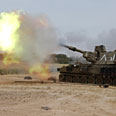
IDF fire
צילום: אנה ברוש, דובר צה"ל
War on Qassams not kosher
Some methods of dealing with rocket attacks simply not kosher
Springtime in Israel. Green, flowering fields fill the eye. The sunshine paints the view brilliantly, before the summer heat dries it all up.
If you listen carefully, you can hear the sounds of spring: Birds chirping, the buzz of mosquitoes, and the incessant sound of IDF artillery, turning the lives of innocent Gazans into a living hell.
Springtime's here, alright. The IDF's firing a lot, alright, thousands of shells into "open fields" from where the Qassam Rockets are being fired. Of course, the term "open fields" is given to interpretation.
In line with new orders, the army has "greatly reduced the safety range of its shells, and at the moment the shells are landing very close to populated areas in Gaza."
Flexible security
What is the IDF's understanding of security? It is (very) flexible.
For instance, former Chief of Staff Moshe Yaalon announced that the IDF had reduced it range of security and would henceforth include the wives of wanted Palestinians (if not yet their children). This is the IDF's range of security. How spring like.
And what, essentially, is the idea behind this massive onslaught at the private homes of Gaza? There is no direct connection to the Qassam Rockets.
Qassams are primitive rockets. They can be fired from just about anywhere, even a backyard. They are not fired from open fields, and the gunmen do not need advanced equipment or complicated logistics.
And IDF attacks almost always strike the innocent. The reason they are being fired is psychological. They are intended to give Israelis a nice feeling for the beginning of Pesach – "See, the IDF isn't sitting on its hands. Quite the opposite, the army is using what the media admiringly calls its 'iron fist', and is striking painful blows to the innocent."
Sophisticated psychology
But more importantly, the attacks are also intended - pay attention to the sophisticated psychology here – to put pressure on the civilian population, that will put pressure on PA authorities, that will put pressure on the Qassam gunmen to stop shooting. It's like that song about the little goat at the end of the Pesach haggadah.
We've tried this trick before, and it's worked like a charm. Like the 1996 Operation Grapes of Wrath, for instance., where Israel put great pressure on the Lebanese population, resulting in Hizbullah being expelled with its proverbial tail between its legs from southern Lebanon.
Yeah, yeah. Well, not exactly. But the idea still sounds good.
And by the way, the problem starts with suicide bombers, who according to the IDF use the civilian population. We're not like them, you know. We just put "pressure" on civilians, so they'll put pressure on the PA, so they'll put pressure on the Qassam folks.
What's especially nice about it is that we think this is just the way of the world.
Jewish compassion
On Sunday, we read the army's threats to "get" the Qassam gunmen, then on Monday, 1,200 shells later, the issue was pushed to the sidelines. That is to say, not entirely.
You can find an article, maybe even a picture, in Yedioth Ahronoth, of a dog at Kibbutz Zikim that was literally scared to death by the exchange of fire. "The artillery fire killed our dog," screamed the headlines. Who said Jews had no compassion?
How have thousands of women and children and old people in Gaza reacted to the shells? Its hard to know. They, apparently, are too busy putting pressure on the PA to put pressure on the gunmen, etc., and preparing for the odd shell that misses its target and kills dozens of innocents.
Unkosher methods
Israel finds itself in a poor situation vis-à-vis the Qassams. It is hard to deal with a weapon that is not really an existential threat on one hand, but cannot be tolerated on the other.
It's not easy to know what to do, but it is very easy to know what shouldn't be done. We must not hold innocent people hostage. We must not punish them for the sins of others. Even during Pesach, there are methods that are simply not kosher.










